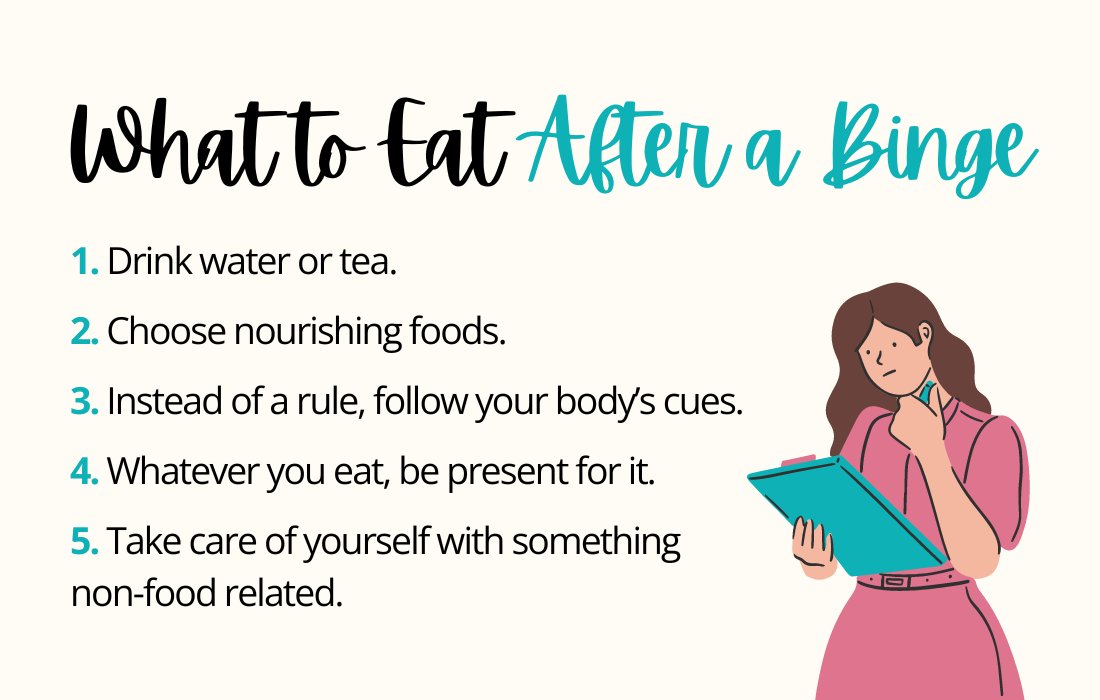Written by Jenn Hand, Holistic Nutritionist, Board Certified Health Coach & Binge Eating Coach, NBC-HWC
“What Should I Eat After a Binge?”
If you’re wondering what to eat after a binge, this is for you.
Whenever I binged, I immediately promised myself I’d do better next time.
I’d swear off sweets and carbs forever and thought eating very little would help me get back into balance. But over time, I realized the restriction was actually causing the bingeing.
The more I worked to break the binge-restrict cycle, the more trapped I felt. Once I was able to stop restricting post-binge, I began to come back from the extremes and began to feel more balanced.
Here are a few tips that helped me and that also help my clients:
What to Eat After a Binge:
1. Drink water or tea
While technically not a food, water or tea can help calm your mind and body after a binge.
Be mindful not to “overwhelm” your stomach if you feel full, but see if you can add in extra water/tea the day after a binge!
2. Choose nourishing foods
Explore foods from the earth to move yourself back into balance post-binge.
Focus on incorporating fruits, vegetables, lean proteins, and complex carbohydrates into your meals. Your body may want to eat a bit lighter the next time you’re hungry, so aim for light, nutritious foods to bring yourself back into balance.
Further Reading: How to Make a Healthy Salad (That’s Actually Delicious!)
3. Instead of a rule, follow your body’s cues
Tune into your body’s hunger cues and eat when you feel physically hungry again.
Your mind may want to restrict or “punish” yourself. Avoid an extreme diet or restriction to “compensate” for the binge. Instead, honor your body’s natural hunger signals and choose foods that will satisfy and nourish you.
Eating balanced meals and snacks throughout the day can help stabilize blood sugar levels and prevent future episodes of overeating.
4. Whatever you eat, be present for it
Mindful eating can slow you down and help you cultivate a positive relationship with food and your body.
Slow down and savor each bite, paying attention to the flavors, textures, and sensations of the food. Notice any thoughts or emotions that arise without judgment, and remind yourself that every eating experience is an opportunity to nourish and care for your body.
By practicing mindfulness, you can enhance your awareness of hunger and fullness cues, making it easier to make nourishing choices in the future.
5. Take care of yourself with something non-food related
A list of what to eat without including what to eat?!
Yes! Because a binge is so much more than just something physical, we need to address our full selves post-binge. Self-care can nurture your mind, body, and soul. Take time to rest, relax, and engage in activities that bring you comfort.
Whether it’s going for a leisurely walk in nature, practicing yoga or meditation, or enjoying a warm bath, self-care plays a crucial role in moving through feelings of “I’m a failure” with grace and compassion.

Common Questions:
How long should I wait before eating again after binge eating?
Listen to your body and wait until you feel physically hungry again, rather than adhering to a strict timeline, “supposed to” or rule.
Are there any foods I should avoid right after a binge?
If you can, see if you can avoid overly processed or greasy foods immediately after a binge, as they can further upset your stomach and perpetuate feelings of discomfort.
How can I get back on track with my eating habits after a binge?
Getting back on track involves gently tuning into your body’s hunger and fullness cues, eating balanced meals, and practicing self-care activities that nourish your mind and body. Be as kind and compassionate as you can as you move through the post-binge feelings.
Is it okay to skip meals the day after a binge?
While the mind may tell you it’s “best” to skip meals, this can cause you to end up overeating again over time (it’s the restrict/binge cycle.) See if you can eat regular, balanced meals to support your body’s recovery and nourishment.
Can exercise help me recover from a binge?
Gentle movement, such as walking, yoga, or stretching, can help with physical discomfort and feeling better a binge.
Related Articles
⚪ Should I Fast After a Binge?
⚪ How To Stop Weekend Binge Eating
⚪ How to Recover from a Carb Binge
Get the Normal Eater’s Newsletter
Join 8000+ women who are overcoming overeating, binge eating, and breaking up with dieting forever. Get Jenn’s inspiring and actionable weekly newsletter with the latest posts, podcasts, and tips on how to love your body, find food freedom, and lose weight holistically.
Get the Normal Eater’s NewsletterWork with an Emotional Eating & Holistic Nutrition Coach
Overcome Bingeing and Emotional Eating, and Break Up with Yo-yo Dieting
Working with an emotional eating coach and holistic nutritionist can help you get free from the frustrating binge and restrict cycle and stop yo-yo dieting.
You don’t have to be obsessed with food or have a million rules around eating to find your natural weight and learn to love your body. Ready to actually see a lasting change and experience true freedom?
Schedule a 20-min CallAbout the Author:

Jenn Hand has been helping women like you become normal eaters since 2015.
She’s worked with thousands of women, helping them to balance their bodies, end bingeing, stop obsessing over food, and start feeling amazing again. As a board-certified health coach, binge and emotional eating coach, and holistic nutritionist, Jenn knows how to support you in making real positive changes that last.
Her articles have been published on Mind Body Green, Tiny Buddha, Thrive Global and other local and global media platforms. She’s the author of How to Be a Normal Eater and the creator of The Normal Eater’s Club program. Listen to Jenn’s advice and tips on the Cake Doesn’t Count Podcast, or read more of her articles for free on the Food Freedom Blog.
Learn About Coaching!




